Project MGMT: Transformational Leadership and Job Satisfaction
VerifiedAdded on 2023/04/21
|52
|12510
|183
Report
AI Summary
This report, titled "Transformational Leadership of headmaster and Professional Learning Communities in primary school, Manjung District, Perak," investigates the impact of transformational leadership on teacher job satisfaction in primary schools. The study explores the four components of transformational leadership: idealized influence, individual consideration, inspirational motivation, and intellectual stimulation. The research includes a literature review of transformational leadership in education, school leadership in Malaysia, and the methodology employed, which encompasses a positivism research philosophy, a quantitative research design, and data collection through surveys. The findings, based on data analysis, reveal insights into the relationship between leadership styles and teacher job satisfaction, providing recommendations for school management to enhance teacher satisfaction and prevent attrition. The research concludes with a summary of the findings, conclusions, and implications for educational leadership.
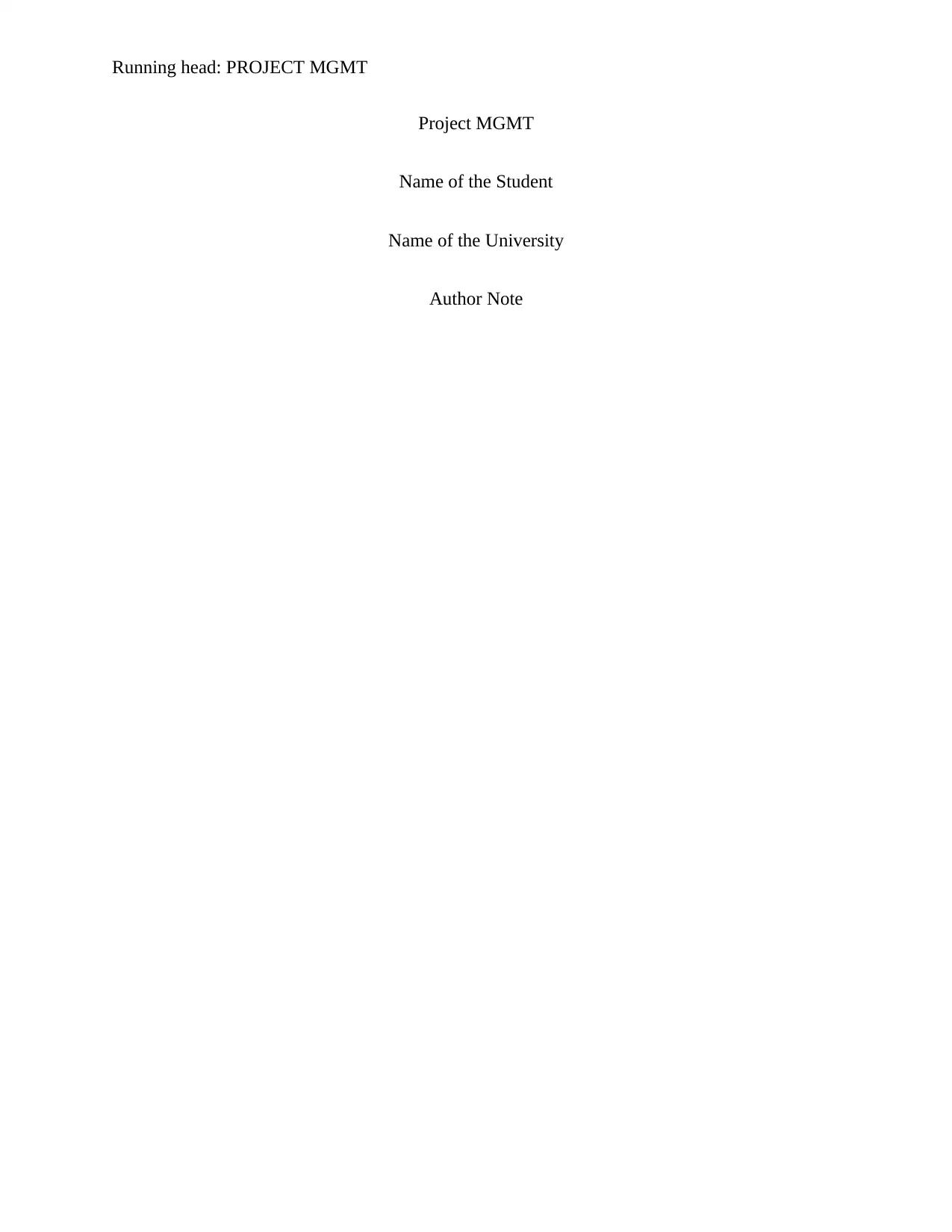
Running head: PROJECT MGMT
Project MGMT
Name of the Student
Name of the University
Author Note
Project MGMT
Name of the Student
Name of the University
Author Note
Paraphrase This Document
Need a fresh take? Get an instant paraphrase of this document with our AI Paraphraser
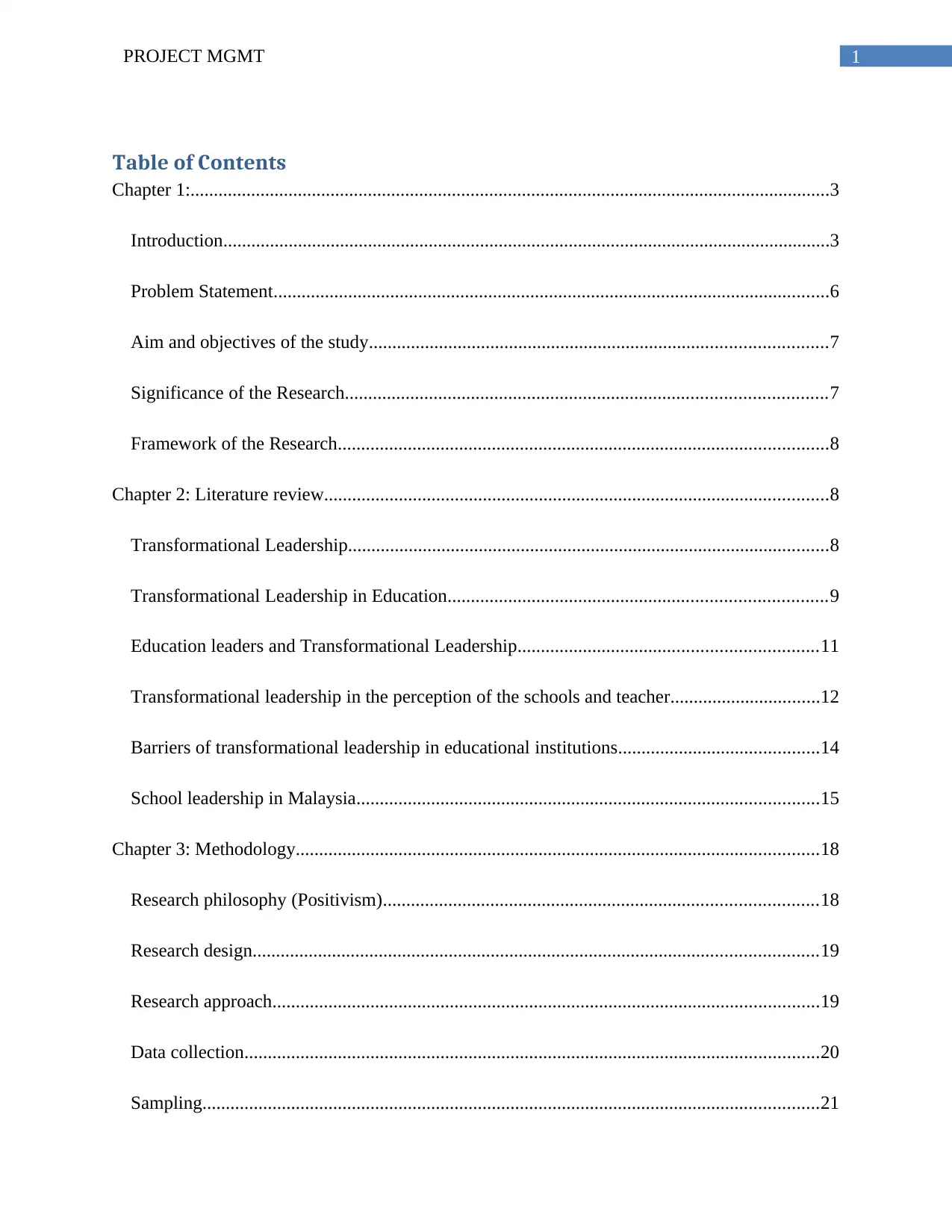
1PROJECT MGMT
Table of Contents
Chapter 1:.........................................................................................................................................3
Introduction..................................................................................................................................3
Problem Statement.......................................................................................................................6
Aim and objectives of the study..................................................................................................7
Significance of the Research.......................................................................................................7
Framework of the Research.........................................................................................................8
Chapter 2: Literature review............................................................................................................8
Transformational Leadership.......................................................................................................8
Transformational Leadership in Education.................................................................................9
Education leaders and Transformational Leadership................................................................11
Transformational leadership in the perception of the schools and teacher................................12
Barriers of transformational leadership in educational institutions...........................................14
School leadership in Malaysia...................................................................................................15
Chapter 3: Methodology................................................................................................................18
Research philosophy (Positivism).............................................................................................18
Research design.........................................................................................................................19
Research approach.....................................................................................................................19
Data collection...........................................................................................................................20
Sampling....................................................................................................................................21
Table of Contents
Chapter 1:.........................................................................................................................................3
Introduction..................................................................................................................................3
Problem Statement.......................................................................................................................6
Aim and objectives of the study..................................................................................................7
Significance of the Research.......................................................................................................7
Framework of the Research.........................................................................................................8
Chapter 2: Literature review............................................................................................................8
Transformational Leadership.......................................................................................................8
Transformational Leadership in Education.................................................................................9
Education leaders and Transformational Leadership................................................................11
Transformational leadership in the perception of the schools and teacher................................12
Barriers of transformational leadership in educational institutions...........................................14
School leadership in Malaysia...................................................................................................15
Chapter 3: Methodology................................................................................................................18
Research philosophy (Positivism).............................................................................................18
Research design.........................................................................................................................19
Research approach.....................................................................................................................19
Data collection...........................................................................................................................20
Sampling....................................................................................................................................21
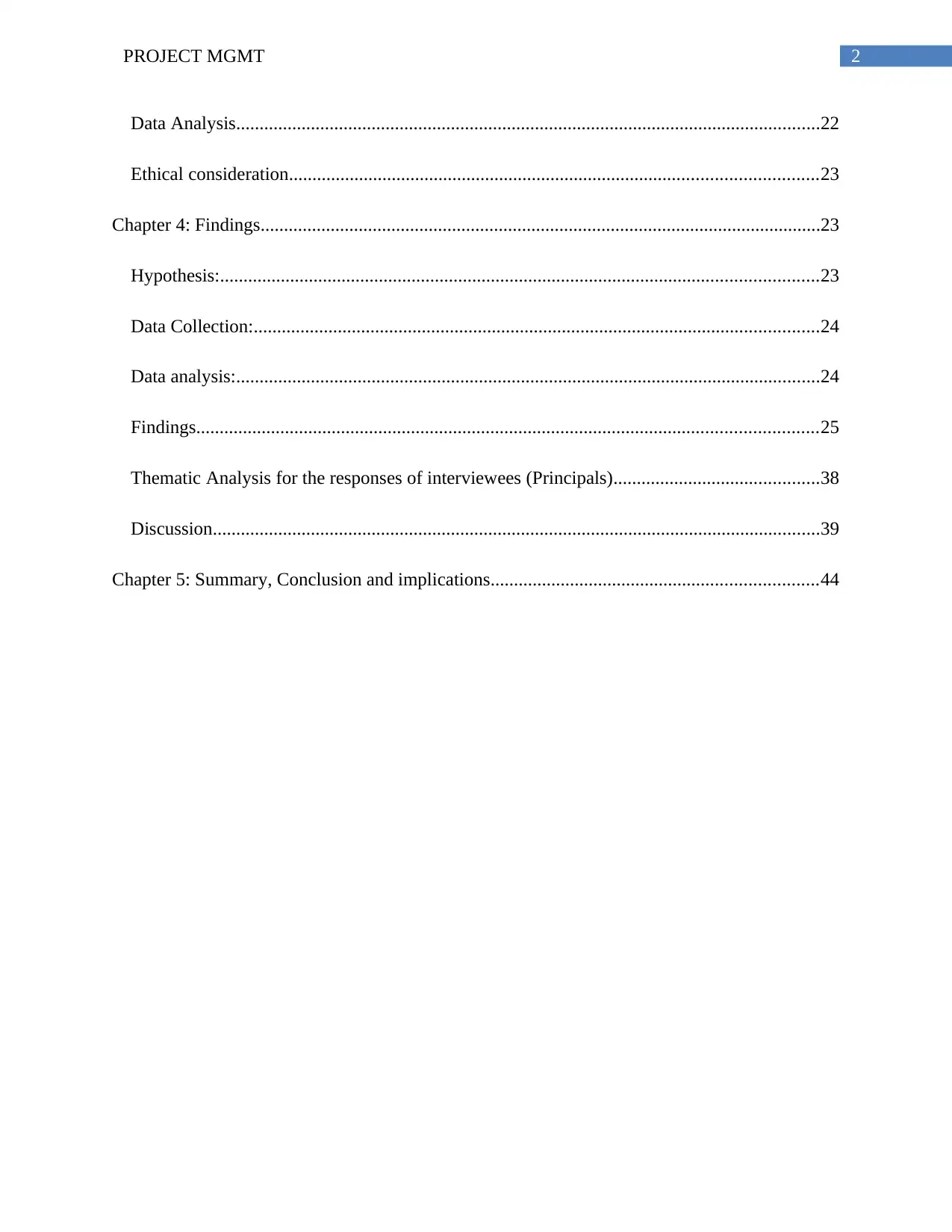
2PROJECT MGMT
Data Analysis.............................................................................................................................22
Ethical consideration.................................................................................................................23
Chapter 4: Findings........................................................................................................................23
Hypothesis:................................................................................................................................23
Data Collection:.........................................................................................................................24
Data analysis:.............................................................................................................................24
Findings.....................................................................................................................................25
Thematic Analysis for the responses of interviewees (Principals)............................................38
Discussion..................................................................................................................................39
Chapter 5: Summary, Conclusion and implications......................................................................44
Data Analysis.............................................................................................................................22
Ethical consideration.................................................................................................................23
Chapter 4: Findings........................................................................................................................23
Hypothesis:................................................................................................................................23
Data Collection:.........................................................................................................................24
Data analysis:.............................................................................................................................24
Findings.....................................................................................................................................25
Thematic Analysis for the responses of interviewees (Principals)............................................38
Discussion..................................................................................................................................39
Chapter 5: Summary, Conclusion and implications......................................................................44
⊘ This is a preview!⊘
Do you want full access?
Subscribe today to unlock all pages.

Trusted by 1+ million students worldwide
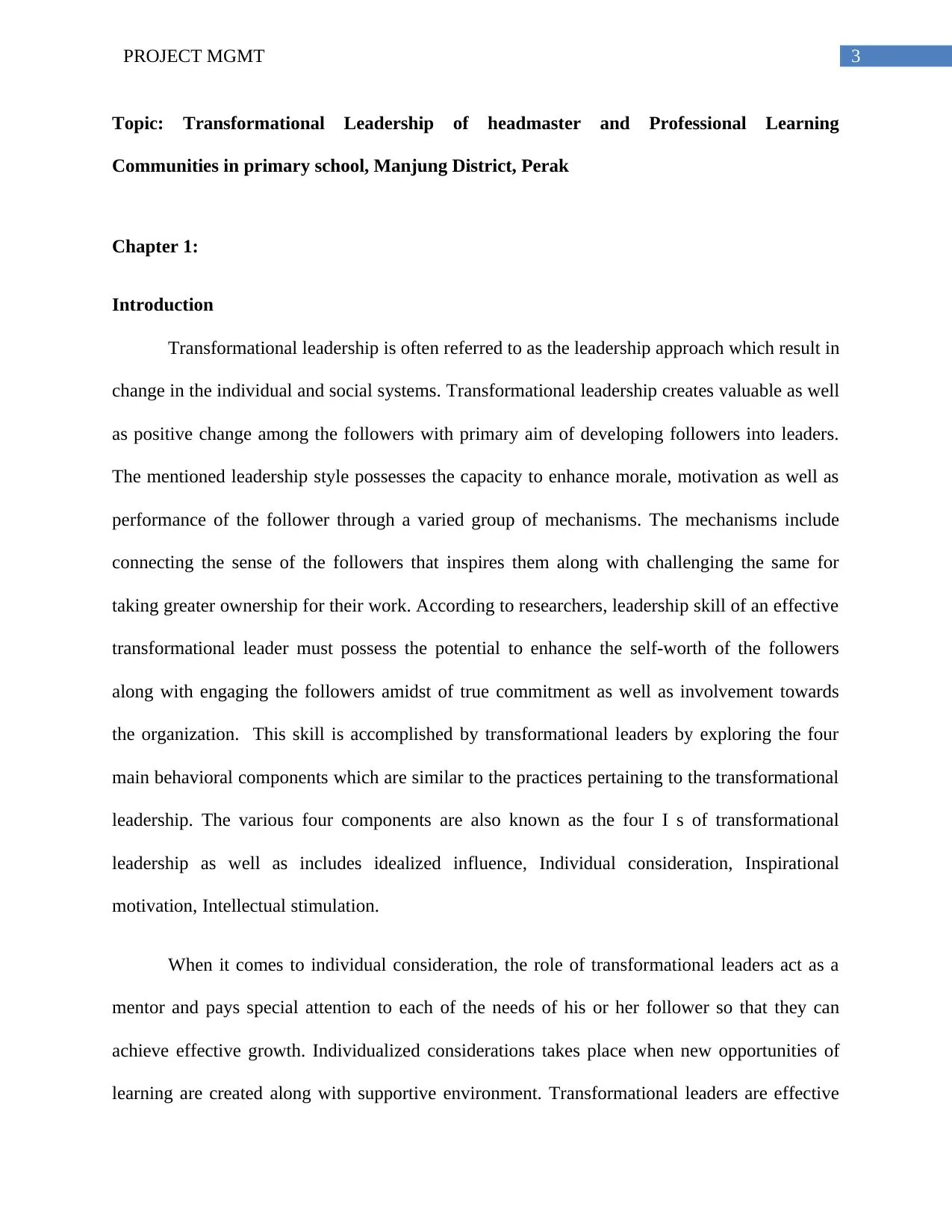
3PROJECT MGMT
Topic: Transformational Leadership of headmaster and Professional Learning
Communities in primary school, Manjung District, Perak
Chapter 1:
Introduction
Transformational leadership is often referred to as the leadership approach which result in
change in the individual and social systems. Transformational leadership creates valuable as well
as positive change among the followers with primary aim of developing followers into leaders.
The mentioned leadership style possesses the capacity to enhance morale, motivation as well as
performance of the follower through a varied group of mechanisms. The mechanisms include
connecting the sense of the followers that inspires them along with challenging the same for
taking greater ownership for their work. According to researchers, leadership skill of an effective
transformational leader must possess the potential to enhance the self-worth of the followers
along with engaging the followers amidst of true commitment as well as involvement towards
the organization. This skill is accomplished by transformational leaders by exploring the four
main behavioral components which are similar to the practices pertaining to the transformational
leadership. The various four components are also known as the four I s of transformational
leadership as well as includes idealized influence, Individual consideration, Inspirational
motivation, Intellectual stimulation.
When it comes to individual consideration, the role of transformational leaders act as a
mentor and pays special attention to each of the needs of his or her follower so that they can
achieve effective growth. Individualized considerations takes place when new opportunities of
learning are created along with supportive environment. Transformational leaders are effective
Topic: Transformational Leadership of headmaster and Professional Learning
Communities in primary school, Manjung District, Perak
Chapter 1:
Introduction
Transformational leadership is often referred to as the leadership approach which result in
change in the individual and social systems. Transformational leadership creates valuable as well
as positive change among the followers with primary aim of developing followers into leaders.
The mentioned leadership style possesses the capacity to enhance morale, motivation as well as
performance of the follower through a varied group of mechanisms. The mechanisms include
connecting the sense of the followers that inspires them along with challenging the same for
taking greater ownership for their work. According to researchers, leadership skill of an effective
transformational leader must possess the potential to enhance the self-worth of the followers
along with engaging the followers amidst of true commitment as well as involvement towards
the organization. This skill is accomplished by transformational leaders by exploring the four
main behavioral components which are similar to the practices pertaining to the transformational
leadership. The various four components are also known as the four I s of transformational
leadership as well as includes idealized influence, Individual consideration, Inspirational
motivation, Intellectual stimulation.
When it comes to individual consideration, the role of transformational leaders act as a
mentor and pays special attention to each of the needs of his or her follower so that they can
achieve effective growth. Individualized considerations takes place when new opportunities of
learning are created along with supportive environment. Transformational leaders are effective
Paraphrase This Document
Need a fresh take? Get an instant paraphrase of this document with our AI Paraphraser
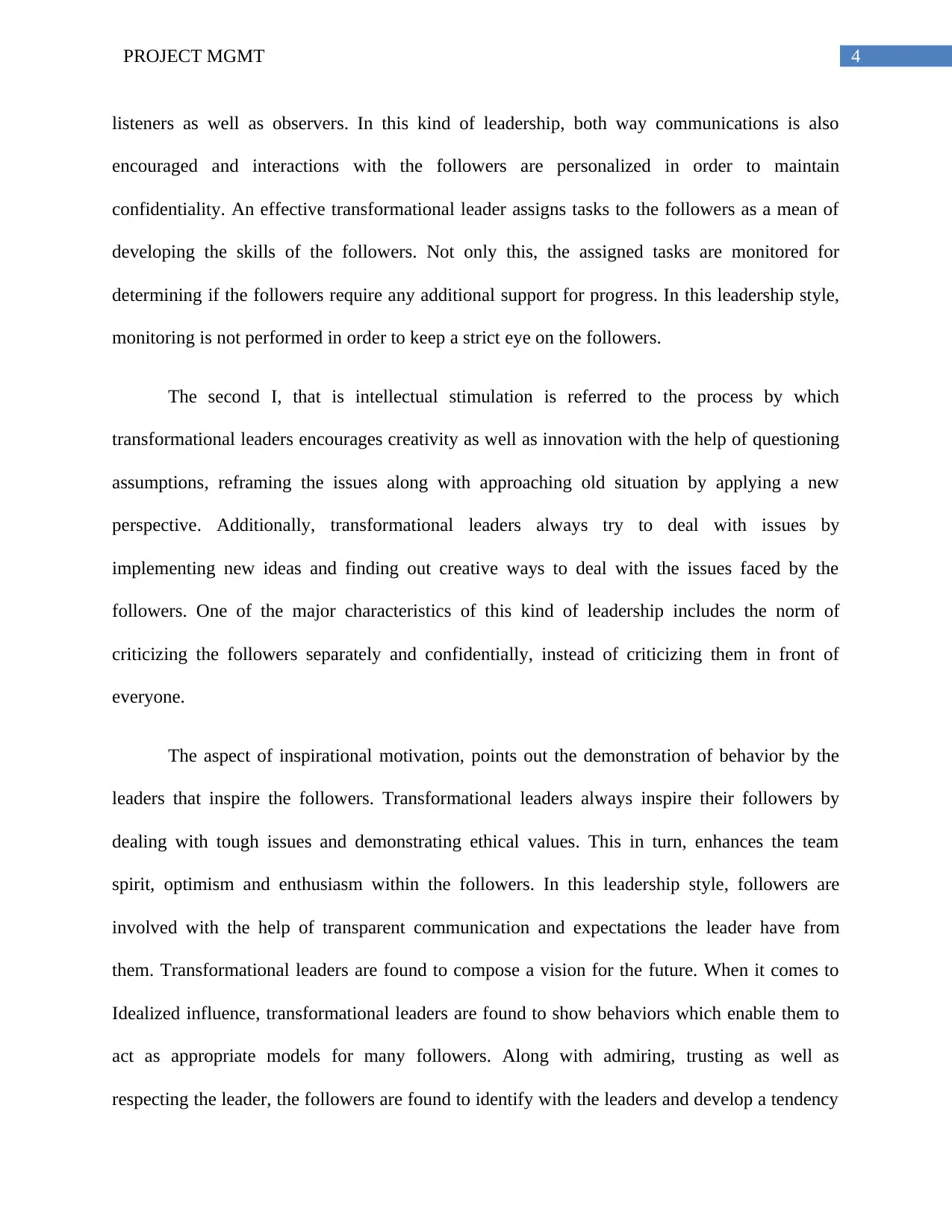
4PROJECT MGMT
listeners as well as observers. In this kind of leadership, both way communications is also
encouraged and interactions with the followers are personalized in order to maintain
confidentiality. An effective transformational leader assigns tasks to the followers as a mean of
developing the skills of the followers. Not only this, the assigned tasks are monitored for
determining if the followers require any additional support for progress. In this leadership style,
monitoring is not performed in order to keep a strict eye on the followers.
The second I, that is intellectual stimulation is referred to the process by which
transformational leaders encourages creativity as well as innovation with the help of questioning
assumptions, reframing the issues along with approaching old situation by applying a new
perspective. Additionally, transformational leaders always try to deal with issues by
implementing new ideas and finding out creative ways to deal with the issues faced by the
followers. One of the major characteristics of this kind of leadership includes the norm of
criticizing the followers separately and confidentially, instead of criticizing them in front of
everyone.
The aspect of inspirational motivation, points out the demonstration of behavior by the
leaders that inspire the followers. Transformational leaders always inspire their followers by
dealing with tough issues and demonstrating ethical values. This in turn, enhances the team
spirit, optimism and enthusiasm within the followers. In this leadership style, followers are
involved with the help of transparent communication and expectations the leader have from
them. Transformational leaders are found to compose a vision for the future. When it comes to
Idealized influence, transformational leaders are found to show behaviors which enable them to
act as appropriate models for many followers. Along with admiring, trusting as well as
respecting the leader, the followers are found to identify with the leaders and develop a tendency
listeners as well as observers. In this kind of leadership, both way communications is also
encouraged and interactions with the followers are personalized in order to maintain
confidentiality. An effective transformational leader assigns tasks to the followers as a mean of
developing the skills of the followers. Not only this, the assigned tasks are monitored for
determining if the followers require any additional support for progress. In this leadership style,
monitoring is not performed in order to keep a strict eye on the followers.
The second I, that is intellectual stimulation is referred to the process by which
transformational leaders encourages creativity as well as innovation with the help of questioning
assumptions, reframing the issues along with approaching old situation by applying a new
perspective. Additionally, transformational leaders always try to deal with issues by
implementing new ideas and finding out creative ways to deal with the issues faced by the
followers. One of the major characteristics of this kind of leadership includes the norm of
criticizing the followers separately and confidentially, instead of criticizing them in front of
everyone.
The aspect of inspirational motivation, points out the demonstration of behavior by the
leaders that inspire the followers. Transformational leaders always inspire their followers by
dealing with tough issues and demonstrating ethical values. This in turn, enhances the team
spirit, optimism and enthusiasm within the followers. In this leadership style, followers are
involved with the help of transparent communication and expectations the leader have from
them. Transformational leaders are found to compose a vision for the future. When it comes to
Idealized influence, transformational leaders are found to show behaviors which enable them to
act as appropriate models for many followers. Along with admiring, trusting as well as
respecting the leader, the followers are found to identify with the leaders and develop a tendency
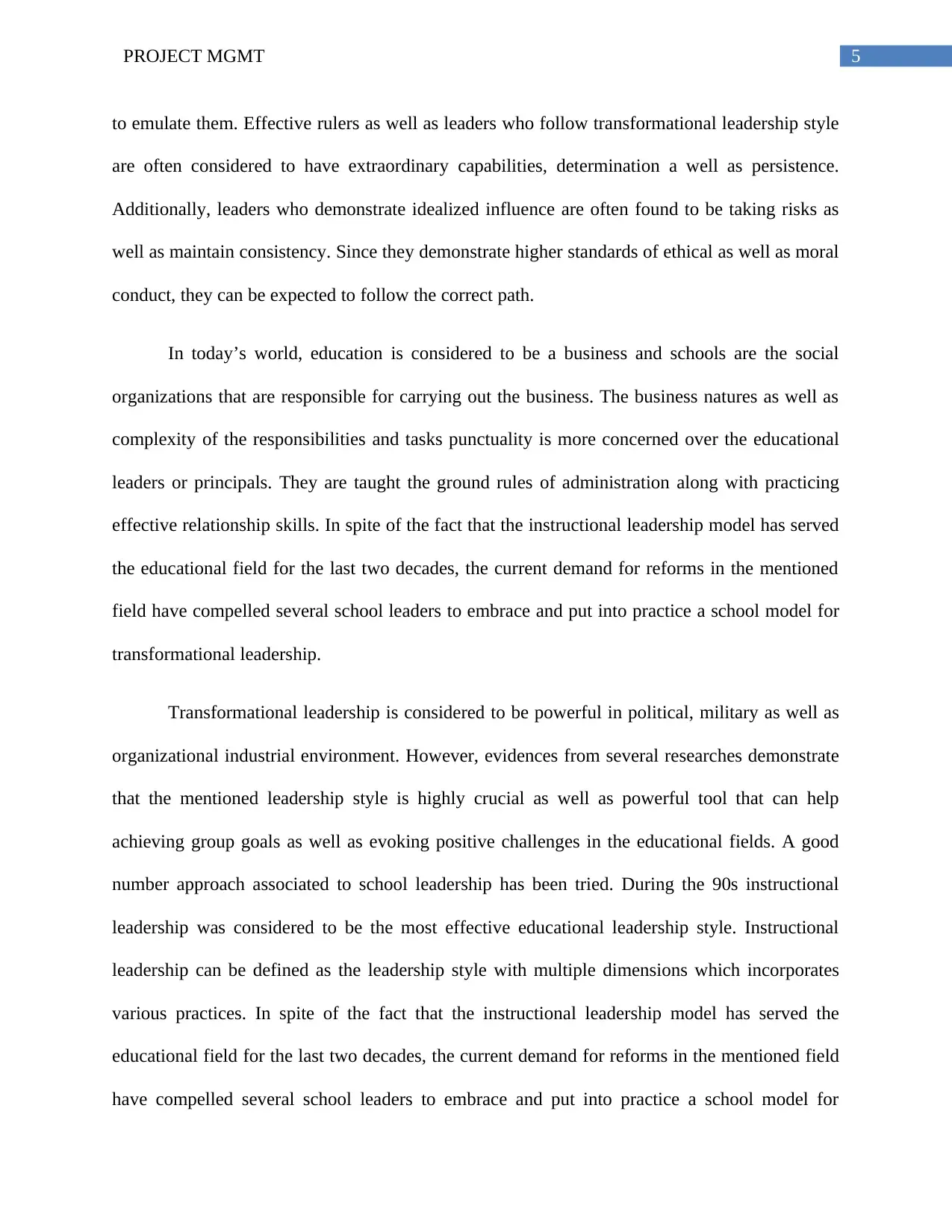
5PROJECT MGMT
to emulate them. Effective rulers as well as leaders who follow transformational leadership style
are often considered to have extraordinary capabilities, determination a well as persistence.
Additionally, leaders who demonstrate idealized influence are often found to be taking risks as
well as maintain consistency. Since they demonstrate higher standards of ethical as well as moral
conduct, they can be expected to follow the correct path.
In today’s world, education is considered to be a business and schools are the social
organizations that are responsible for carrying out the business. The business natures as well as
complexity of the responsibilities and tasks punctuality is more concerned over the educational
leaders or principals. They are taught the ground rules of administration along with practicing
effective relationship skills. In spite of the fact that the instructional leadership model has served
the educational field for the last two decades, the current demand for reforms in the mentioned
field have compelled several school leaders to embrace and put into practice a school model for
transformational leadership.
Transformational leadership is considered to be powerful in political, military as well as
organizational industrial environment. However, evidences from several researches demonstrate
that the mentioned leadership style is highly crucial as well as powerful tool that can help
achieving group goals as well as evoking positive challenges in the educational fields. A good
number approach associated to school leadership has been tried. During the 90s instructional
leadership was considered to be the most effective educational leadership style. Instructional
leadership can be defined as the leadership style with multiple dimensions which incorporates
various practices. In spite of the fact that the instructional leadership model has served the
educational field for the last two decades, the current demand for reforms in the mentioned field
have compelled several school leaders to embrace and put into practice a school model for
to emulate them. Effective rulers as well as leaders who follow transformational leadership style
are often considered to have extraordinary capabilities, determination a well as persistence.
Additionally, leaders who demonstrate idealized influence are often found to be taking risks as
well as maintain consistency. Since they demonstrate higher standards of ethical as well as moral
conduct, they can be expected to follow the correct path.
In today’s world, education is considered to be a business and schools are the social
organizations that are responsible for carrying out the business. The business natures as well as
complexity of the responsibilities and tasks punctuality is more concerned over the educational
leaders or principals. They are taught the ground rules of administration along with practicing
effective relationship skills. In spite of the fact that the instructional leadership model has served
the educational field for the last two decades, the current demand for reforms in the mentioned
field have compelled several school leaders to embrace and put into practice a school model for
transformational leadership.
Transformational leadership is considered to be powerful in political, military as well as
organizational industrial environment. However, evidences from several researches demonstrate
that the mentioned leadership style is highly crucial as well as powerful tool that can help
achieving group goals as well as evoking positive challenges in the educational fields. A good
number approach associated to school leadership has been tried. During the 90s instructional
leadership was considered to be the most effective educational leadership style. Instructional
leadership can be defined as the leadership style with multiple dimensions which incorporates
various practices. In spite of the fact that the instructional leadership model has served the
educational field for the last two decades, the current demand for reforms in the mentioned field
have compelled several school leaders to embrace and put into practice a school model for
⊘ This is a preview!⊘
Do you want full access?
Subscribe today to unlock all pages.

Trusted by 1+ million students worldwide
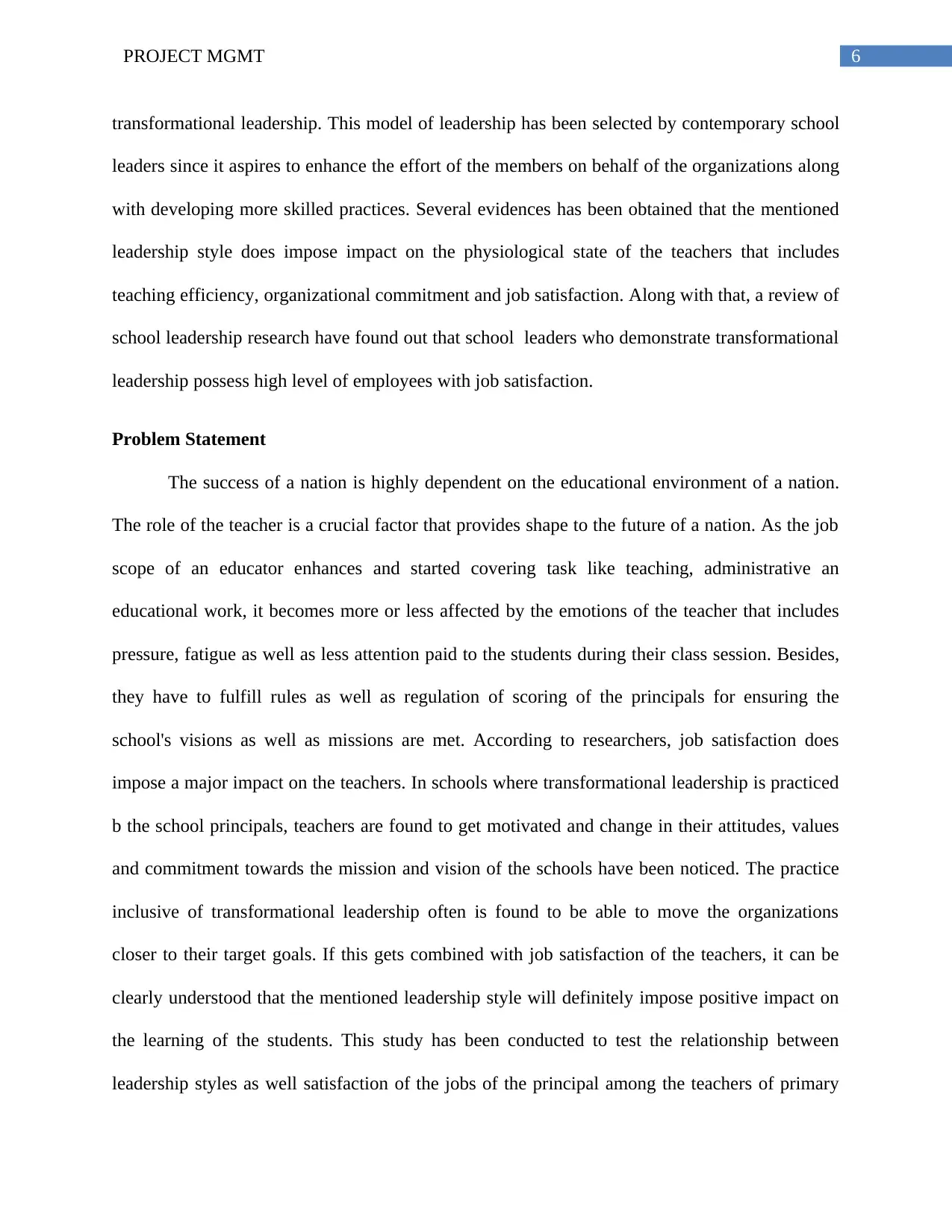
6PROJECT MGMT
transformational leadership. This model of leadership has been selected by contemporary school
leaders since it aspires to enhance the effort of the members on behalf of the organizations along
with developing more skilled practices. Several evidences has been obtained that the mentioned
leadership style does impose impact on the physiological state of the teachers that includes
teaching efficiency, organizational commitment and job satisfaction. Along with that, a review of
school leadership research have found out that school leaders who demonstrate transformational
leadership possess high level of employees with job satisfaction.
Problem Statement
The success of a nation is highly dependent on the educational environment of a nation.
The role of the teacher is a crucial factor that provides shape to the future of a nation. As the job
scope of an educator enhances and started covering task like teaching, administrative an
educational work, it becomes more or less affected by the emotions of the teacher that includes
pressure, fatigue as well as less attention paid to the students during their class session. Besides,
they have to fulfill rules as well as regulation of scoring of the principals for ensuring the
school's visions as well as missions are met. According to researchers, job satisfaction does
impose a major impact on the teachers. In schools where transformational leadership is practiced
b the school principals, teachers are found to get motivated and change in their attitudes, values
and commitment towards the mission and vision of the schools have been noticed. The practice
inclusive of transformational leadership often is found to be able to move the organizations
closer to their target goals. If this gets combined with job satisfaction of the teachers, it can be
clearly understood that the mentioned leadership style will definitely impose positive impact on
the learning of the students. This study has been conducted to test the relationship between
leadership styles as well satisfaction of the jobs of the principal among the teachers of primary
transformational leadership. This model of leadership has been selected by contemporary school
leaders since it aspires to enhance the effort of the members on behalf of the organizations along
with developing more skilled practices. Several evidences has been obtained that the mentioned
leadership style does impose impact on the physiological state of the teachers that includes
teaching efficiency, organizational commitment and job satisfaction. Along with that, a review of
school leadership research have found out that school leaders who demonstrate transformational
leadership possess high level of employees with job satisfaction.
Problem Statement
The success of a nation is highly dependent on the educational environment of a nation.
The role of the teacher is a crucial factor that provides shape to the future of a nation. As the job
scope of an educator enhances and started covering task like teaching, administrative an
educational work, it becomes more or less affected by the emotions of the teacher that includes
pressure, fatigue as well as less attention paid to the students during their class session. Besides,
they have to fulfill rules as well as regulation of scoring of the principals for ensuring the
school's visions as well as missions are met. According to researchers, job satisfaction does
impose a major impact on the teachers. In schools where transformational leadership is practiced
b the school principals, teachers are found to get motivated and change in their attitudes, values
and commitment towards the mission and vision of the schools have been noticed. The practice
inclusive of transformational leadership often is found to be able to move the organizations
closer to their target goals. If this gets combined with job satisfaction of the teachers, it can be
clearly understood that the mentioned leadership style will definitely impose positive impact on
the learning of the students. This study has been conducted to test the relationship between
leadership styles as well satisfaction of the jobs of the principal among the teachers of primary
Paraphrase This Document
Need a fresh take? Get an instant paraphrase of this document with our AI Paraphraser
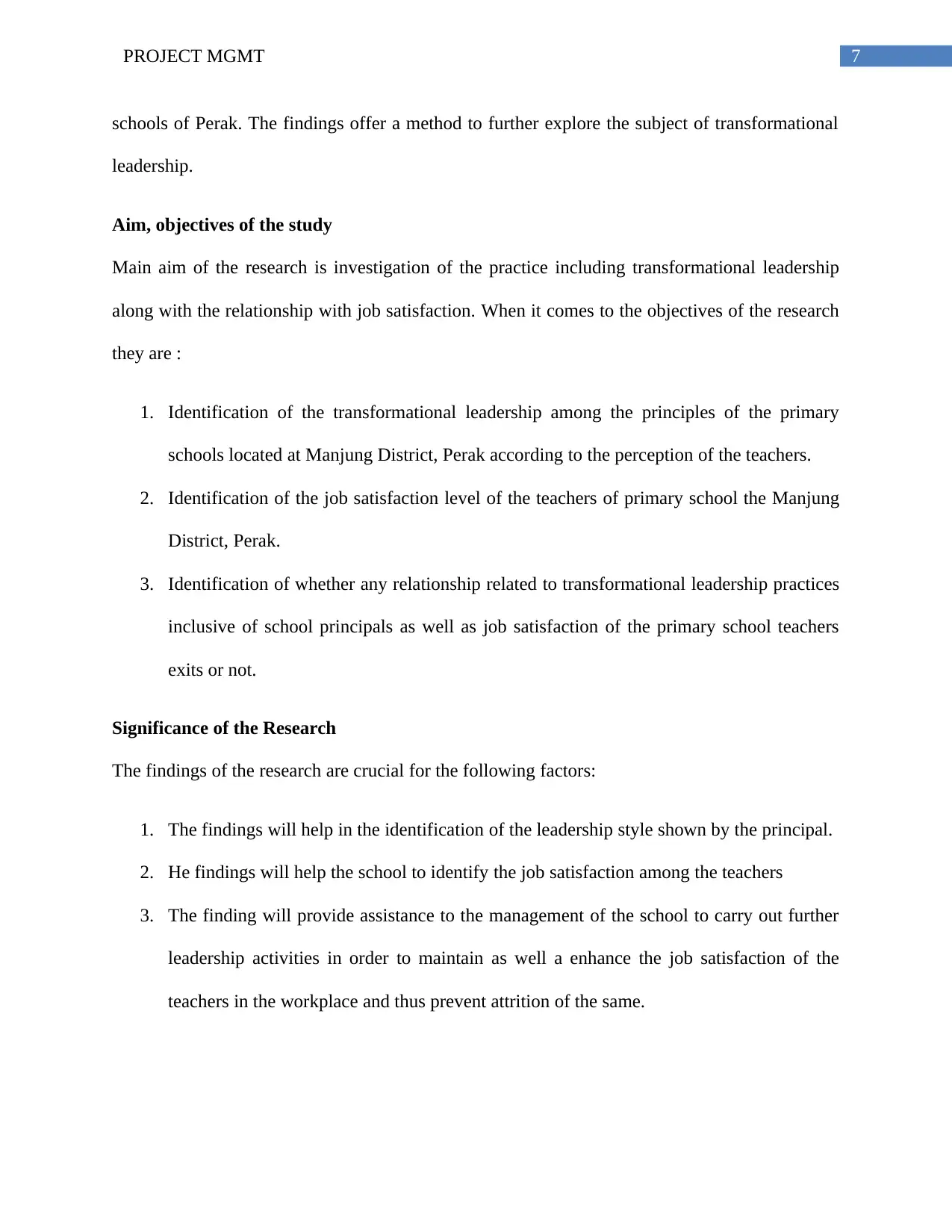
7PROJECT MGMT
schools of Perak. The findings offer a method to further explore the subject of transformational
leadership.
Aim, objectives of the study
Main aim of the research is investigation of the practice including transformational leadership
along with the relationship with job satisfaction. When it comes to the objectives of the research
they are :
1. Identification of the transformational leadership among the principles of the primary
schools located at Manjung District, Perak according to the perception of the teachers.
2. Identification of the job satisfaction level of the teachers of primary school the Manjung
District, Perak.
3. Identification of whether any relationship related to transformational leadership practices
inclusive of school principals as well as job satisfaction of the primary school teachers
exits or not.
Significance of the Research
The findings of the research are crucial for the following factors:
1. The findings will help in the identification of the leadership style shown by the principal.
2. He findings will help the school to identify the job satisfaction among the teachers
3. The finding will provide assistance to the management of the school to carry out further
leadership activities in order to maintain as well a enhance the job satisfaction of the
teachers in the workplace and thus prevent attrition of the same.
schools of Perak. The findings offer a method to further explore the subject of transformational
leadership.
Aim, objectives of the study
Main aim of the research is investigation of the practice including transformational leadership
along with the relationship with job satisfaction. When it comes to the objectives of the research
they are :
1. Identification of the transformational leadership among the principles of the primary
schools located at Manjung District, Perak according to the perception of the teachers.
2. Identification of the job satisfaction level of the teachers of primary school the Manjung
District, Perak.
3. Identification of whether any relationship related to transformational leadership practices
inclusive of school principals as well as job satisfaction of the primary school teachers
exits or not.
Significance of the Research
The findings of the research are crucial for the following factors:
1. The findings will help in the identification of the leadership style shown by the principal.
2. He findings will help the school to identify the job satisfaction among the teachers
3. The finding will provide assistance to the management of the school to carry out further
leadership activities in order to maintain as well a enhance the job satisfaction of the
teachers in the workplace and thus prevent attrition of the same.
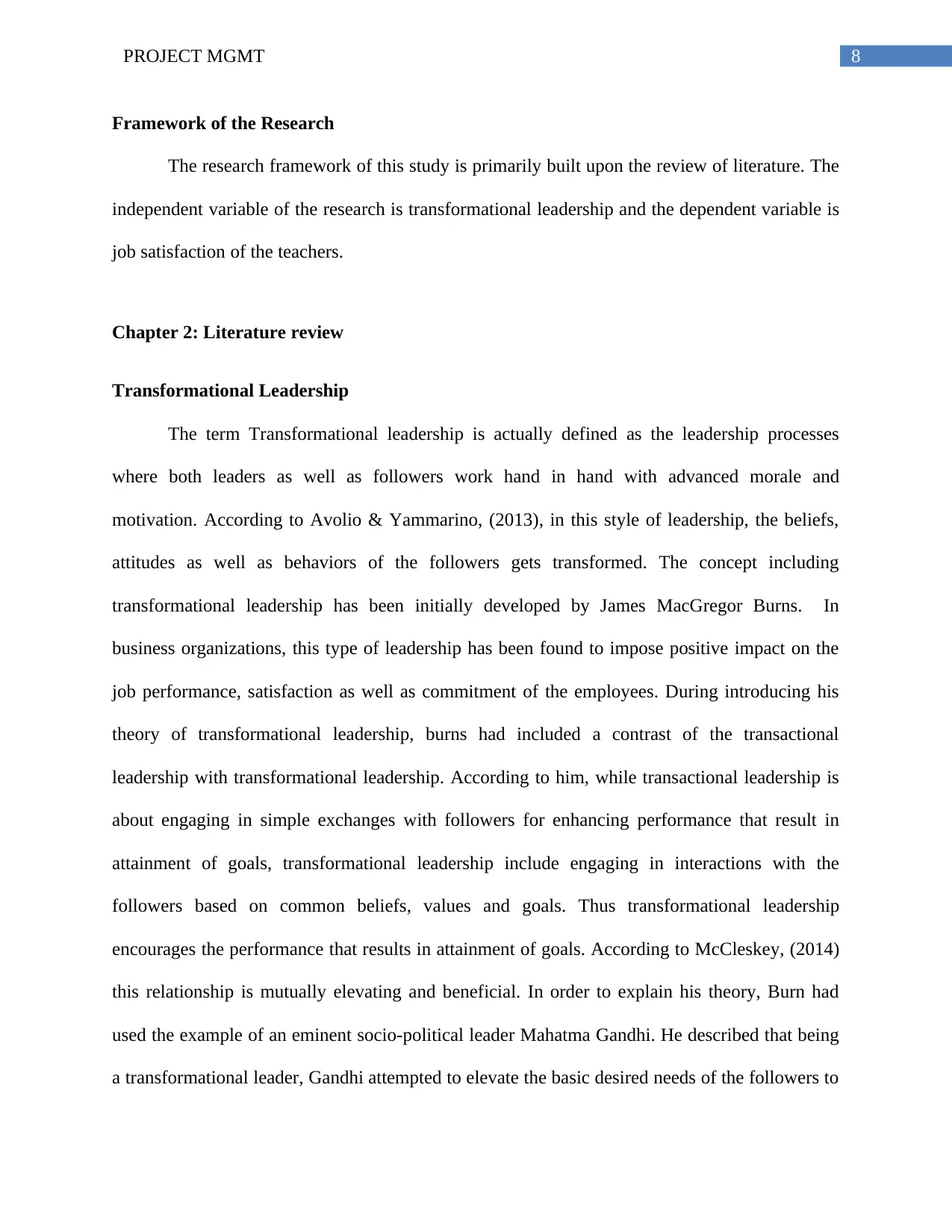
8PROJECT MGMT
Framework of the Research
The research framework of this study is primarily built upon the review of literature. The
independent variable of the research is transformational leadership and the dependent variable is
job satisfaction of the teachers.
Chapter 2: Literature review
Transformational Leadership
The term Transformational leadership is actually defined as the leadership processes
where both leaders as well as followers work hand in hand with advanced morale and
motivation. According to Avolio & Yammarino, (2013), in this style of leadership, the beliefs,
attitudes as well as behaviors of the followers gets transformed. The concept including
transformational leadership has been initially developed by James MacGregor Burns. In
business organizations, this type of leadership has been found to impose positive impact on the
job performance, satisfaction as well as commitment of the employees. During introducing his
theory of transformational leadership, burns had included a contrast of the transactional
leadership with transformational leadership. According to him, while transactional leadership is
about engaging in simple exchanges with followers for enhancing performance that result in
attainment of goals, transformational leadership include engaging in interactions with the
followers based on common beliefs, values and goals. Thus transformational leadership
encourages the performance that results in attainment of goals. According to McCleskey, (2014)
this relationship is mutually elevating and beneficial. In order to explain his theory, Burn had
used the example of an eminent socio-political leader Mahatma Gandhi. He described that being
a transformational leader, Gandhi attempted to elevate the basic desired needs of the followers to
Framework of the Research
The research framework of this study is primarily built upon the review of literature. The
independent variable of the research is transformational leadership and the dependent variable is
job satisfaction of the teachers.
Chapter 2: Literature review
Transformational Leadership
The term Transformational leadership is actually defined as the leadership processes
where both leaders as well as followers work hand in hand with advanced morale and
motivation. According to Avolio & Yammarino, (2013), in this style of leadership, the beliefs,
attitudes as well as behaviors of the followers gets transformed. The concept including
transformational leadership has been initially developed by James MacGregor Burns. In
business organizations, this type of leadership has been found to impose positive impact on the
job performance, satisfaction as well as commitment of the employees. During introducing his
theory of transformational leadership, burns had included a contrast of the transactional
leadership with transformational leadership. According to him, while transactional leadership is
about engaging in simple exchanges with followers for enhancing performance that result in
attainment of goals, transformational leadership include engaging in interactions with the
followers based on common beliefs, values and goals. Thus transformational leadership
encourages the performance that results in attainment of goals. According to McCleskey, (2014)
this relationship is mutually elevating and beneficial. In order to explain his theory, Burn had
used the example of an eminent socio-political leader Mahatma Gandhi. He described that being
a transformational leader, Gandhi attempted to elevate the basic desired needs of the followers to
⊘ This is a preview!⊘
Do you want full access?
Subscribe today to unlock all pages.

Trusted by 1+ million students worldwide
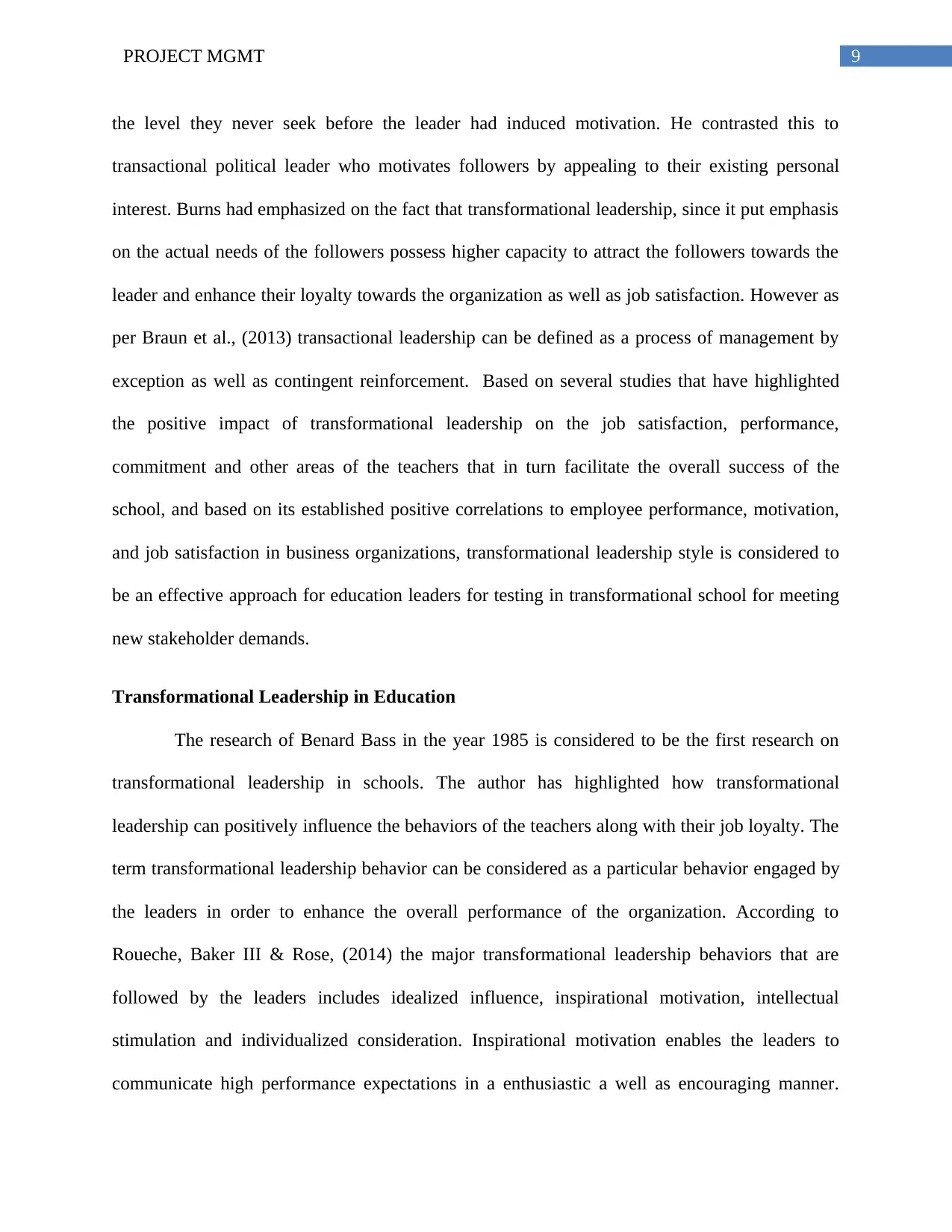
9PROJECT MGMT
the level they never seek before the leader had induced motivation. He contrasted this to
transactional political leader who motivates followers by appealing to their existing personal
interest. Burns had emphasized on the fact that transformational leadership, since it put emphasis
on the actual needs of the followers possess higher capacity to attract the followers towards the
leader and enhance their loyalty towards the organization as well as job satisfaction. However as
per Braun et al., (2013) transactional leadership can be defined as a process of management by
exception as well as contingent reinforcement. Based on several studies that have highlighted
the positive impact of transformational leadership on the job satisfaction, performance,
commitment and other areas of the teachers that in turn facilitate the overall success of the
school, and based on its established positive correlations to employee performance, motivation,
and job satisfaction in business organizations, transformational leadership style is considered to
be an effective approach for education leaders for testing in transformational school for meeting
new stakeholder demands.
Transformational Leadership in Education
The research of Benard Bass in the year 1985 is considered to be the first research on
transformational leadership in schools. The author has highlighted how transformational
leadership can positively influence the behaviors of the teachers along with their job loyalty. The
term transformational leadership behavior can be considered as a particular behavior engaged by
the leaders in order to enhance the overall performance of the organization. According to
Roueche, Baker III & Rose, (2014) the major transformational leadership behaviors that are
followed by the leaders includes idealized influence, inspirational motivation, intellectual
stimulation and individualized consideration. Inspirational motivation enables the leaders to
communicate high performance expectations in a enthusiastic a well as encouraging manner.
the level they never seek before the leader had induced motivation. He contrasted this to
transactional political leader who motivates followers by appealing to their existing personal
interest. Burns had emphasized on the fact that transformational leadership, since it put emphasis
on the actual needs of the followers possess higher capacity to attract the followers towards the
leader and enhance their loyalty towards the organization as well as job satisfaction. However as
per Braun et al., (2013) transactional leadership can be defined as a process of management by
exception as well as contingent reinforcement. Based on several studies that have highlighted
the positive impact of transformational leadership on the job satisfaction, performance,
commitment and other areas of the teachers that in turn facilitate the overall success of the
school, and based on its established positive correlations to employee performance, motivation,
and job satisfaction in business organizations, transformational leadership style is considered to
be an effective approach for education leaders for testing in transformational school for meeting
new stakeholder demands.
Transformational Leadership in Education
The research of Benard Bass in the year 1985 is considered to be the first research on
transformational leadership in schools. The author has highlighted how transformational
leadership can positively influence the behaviors of the teachers along with their job loyalty. The
term transformational leadership behavior can be considered as a particular behavior engaged by
the leaders in order to enhance the overall performance of the organization. According to
Roueche, Baker III & Rose, (2014) the major transformational leadership behaviors that are
followed by the leaders includes idealized influence, inspirational motivation, intellectual
stimulation and individualized consideration. Inspirational motivation enables the leaders to
communicate high performance expectations in a enthusiastic a well as encouraging manner.
Paraphrase This Document
Need a fresh take? Get an instant paraphrase of this document with our AI Paraphraser
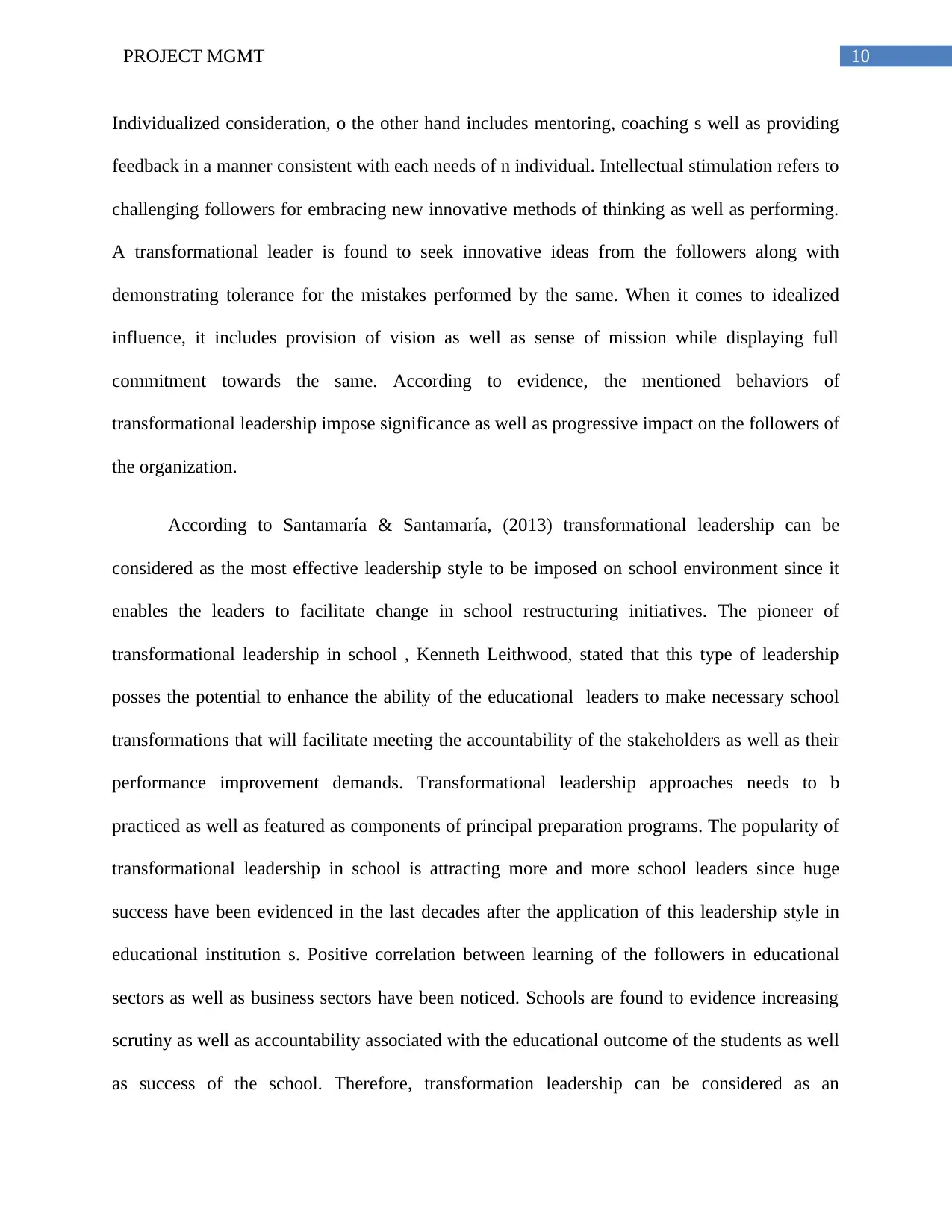
10PROJECT MGMT
Individualized consideration, o the other hand includes mentoring, coaching s well as providing
feedback in a manner consistent with each needs of n individual. Intellectual stimulation refers to
challenging followers for embracing new innovative methods of thinking as well as performing.
A transformational leader is found to seek innovative ideas from the followers along with
demonstrating tolerance for the mistakes performed by the same. When it comes to idealized
influence, it includes provision of vision as well as sense of mission while displaying full
commitment towards the same. According to evidence, the mentioned behaviors of
transformational leadership impose significance as well as progressive impact on the followers of
the organization.
According to Santamaría & Santamaría, (2013) transformational leadership can be
considered as the most effective leadership style to be imposed on school environment since it
enables the leaders to facilitate change in school restructuring initiatives. The pioneer of
transformational leadership in school , Kenneth Leithwood, stated that this type of leadership
posses the potential to enhance the ability of the educational leaders to make necessary school
transformations that will facilitate meeting the accountability of the stakeholders as well as their
performance improvement demands. Transformational leadership approaches needs to b
practiced as well as featured as components of principal preparation programs. The popularity of
transformational leadership in school is attracting more and more school leaders since huge
success have been evidenced in the last decades after the application of this leadership style in
educational institution s. Positive correlation between learning of the followers in educational
sectors as well as business sectors have been noticed. Schools are found to evidence increasing
scrutiny as well as accountability associated with the educational outcome of the students as well
as success of the school. Therefore, transformation leadership can be considered as an
Individualized consideration, o the other hand includes mentoring, coaching s well as providing
feedback in a manner consistent with each needs of n individual. Intellectual stimulation refers to
challenging followers for embracing new innovative methods of thinking as well as performing.
A transformational leader is found to seek innovative ideas from the followers along with
demonstrating tolerance for the mistakes performed by the same. When it comes to idealized
influence, it includes provision of vision as well as sense of mission while displaying full
commitment towards the same. According to evidence, the mentioned behaviors of
transformational leadership impose significance as well as progressive impact on the followers of
the organization.
According to Santamaría & Santamaría, (2013) transformational leadership can be
considered as the most effective leadership style to be imposed on school environment since it
enables the leaders to facilitate change in school restructuring initiatives. The pioneer of
transformational leadership in school , Kenneth Leithwood, stated that this type of leadership
posses the potential to enhance the ability of the educational leaders to make necessary school
transformations that will facilitate meeting the accountability of the stakeholders as well as their
performance improvement demands. Transformational leadership approaches needs to b
practiced as well as featured as components of principal preparation programs. The popularity of
transformational leadership in school is attracting more and more school leaders since huge
success have been evidenced in the last decades after the application of this leadership style in
educational institution s. Positive correlation between learning of the followers in educational
sectors as well as business sectors have been noticed. Schools are found to evidence increasing
scrutiny as well as accountability associated with the educational outcome of the students as well
as success of the school. Therefore, transformation leadership can be considered as an
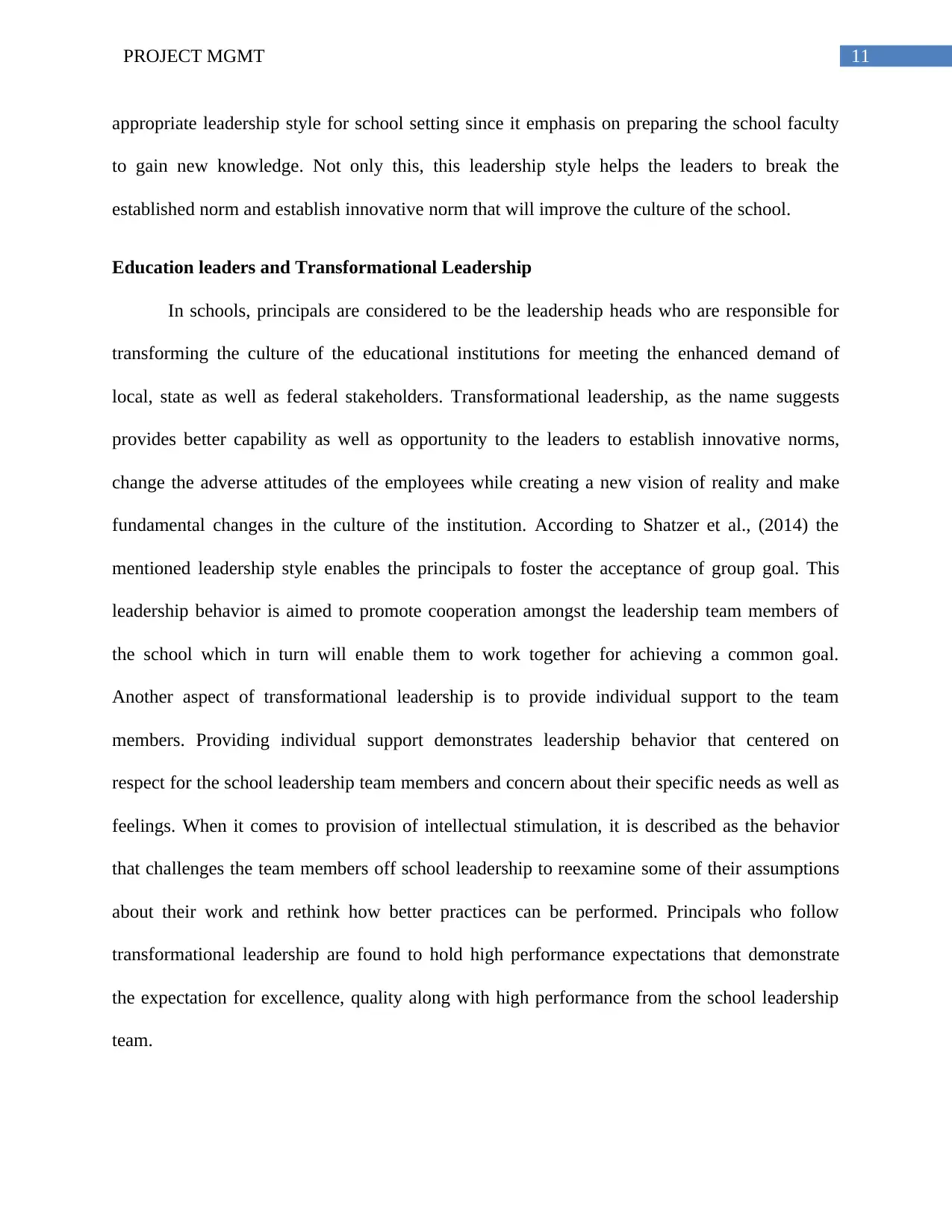
11PROJECT MGMT
appropriate leadership style for school setting since it emphasis on preparing the school faculty
to gain new knowledge. Not only this, this leadership style helps the leaders to break the
established norm and establish innovative norm that will improve the culture of the school.
Education leaders and Transformational Leadership
In schools, principals are considered to be the leadership heads who are responsible for
transforming the culture of the educational institutions for meeting the enhanced demand of
local, state as well as federal stakeholders. Transformational leadership, as the name suggests
provides better capability as well as opportunity to the leaders to establish innovative norms,
change the adverse attitudes of the employees while creating a new vision of reality and make
fundamental changes in the culture of the institution. According to Shatzer et al., (2014) the
mentioned leadership style enables the principals to foster the acceptance of group goal. This
leadership behavior is aimed to promote cooperation amongst the leadership team members of
the school which in turn will enable them to work together for achieving a common goal.
Another aspect of transformational leadership is to provide individual support to the team
members. Providing individual support demonstrates leadership behavior that centered on
respect for the school leadership team members and concern about their specific needs as well as
feelings. When it comes to provision of intellectual stimulation, it is described as the behavior
that challenges the team members off school leadership to reexamine some of their assumptions
about their work and rethink how better practices can be performed. Principals who follow
transformational leadership are found to hold high performance expectations that demonstrate
the expectation for excellence, quality along with high performance from the school leadership
team.
appropriate leadership style for school setting since it emphasis on preparing the school faculty
to gain new knowledge. Not only this, this leadership style helps the leaders to break the
established norm and establish innovative norm that will improve the culture of the school.
Education leaders and Transformational Leadership
In schools, principals are considered to be the leadership heads who are responsible for
transforming the culture of the educational institutions for meeting the enhanced demand of
local, state as well as federal stakeholders. Transformational leadership, as the name suggests
provides better capability as well as opportunity to the leaders to establish innovative norms,
change the adverse attitudes of the employees while creating a new vision of reality and make
fundamental changes in the culture of the institution. According to Shatzer et al., (2014) the
mentioned leadership style enables the principals to foster the acceptance of group goal. This
leadership behavior is aimed to promote cooperation amongst the leadership team members of
the school which in turn will enable them to work together for achieving a common goal.
Another aspect of transformational leadership is to provide individual support to the team
members. Providing individual support demonstrates leadership behavior that centered on
respect for the school leadership team members and concern about their specific needs as well as
feelings. When it comes to provision of intellectual stimulation, it is described as the behavior
that challenges the team members off school leadership to reexamine some of their assumptions
about their work and rethink how better practices can be performed. Principals who follow
transformational leadership are found to hold high performance expectations that demonstrate
the expectation for excellence, quality along with high performance from the school leadership
team.
⊘ This is a preview!⊘
Do you want full access?
Subscribe today to unlock all pages.

Trusted by 1+ million students worldwide
1 out of 52
Related Documents
Your All-in-One AI-Powered Toolkit for Academic Success.
+13062052269
info@desklib.com
Available 24*7 on WhatsApp / Email
![[object Object]](/_next/static/media/star-bottom.7253800d.svg)
Unlock your academic potential
Copyright © 2020–2026 A2Z Services. All Rights Reserved. Developed and managed by ZUCOL.




